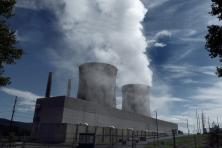Major climate action is unfinished business. We’ve known this since the Clean Energy Jobs bill was hung out to dry at the end of last session.
As we head into the 2020 session, we’re doing everything we can to ensure the Legislature passes a strong cap and invest policy. We’re also working on a number of other complementary bills to move the ball forward on climate – some of which are also unfinished business from last session.
Our economy, transportation system, buildings and energy systems were all historically built on a fossil fuel foundation, and after years of delay, we need many policies and strategies to transition to a carbon-free, clean energy-powered economy. These bills represent the next major opportunities for Oregon to take that next step.
A more detailed summary of our priorities for the short session follows.
Cap-and-Invest (SB 1530)
Our top priority is to finally pass a strong cap-and-invest bill that would cap carbon emissions economy-wide and accelerate clean energy solutions. Earlier this month – the Legislature introduced LC 19 which now has an actual bill number – Senate Bill 1530. Unfortunately, as of this writing, SB 1530 in its current form misses the mark. Although it keeps the overall emissions reduction goals and framework needed to achieve those goals from last year’s cap-and-invest bill (HB 2020B; 2019), it reduces oil companies’ responsibility under the program and pays big industrial gas users for business as usual. It also fails to provide a guarantee that a substantial amount of investments will flow to the communities most impacted by climate change. We‘re pushing to strengthen these critical components in SB 1530.
Here are some of the improvements we’re pushing for:
- Ensure all oil companies pay their fair share, no matter where their product is sold in the state. Oil companies are the largest source of pollution in our state and they should not be let off the hook.
- Do not pay polluters to continue business as usual. We can’t afford business as usual - just ask our ski resorts, our shellfish growers, and our friends in Southern Oregon coping with months of wildfire smoke. We need to ensure the program incentivizes Oregon’s largest users of fracked gas to reduce their fossil fuel use, rather than maintain or increase it.
- Guarantee investments in communities hardest hit by the climate crisis. All along, we’ve fought for investments in communities who need it most because the climate crisis hits them hardest -- these include rural communities, low-income Oregonians, Tribes, and communities of color. There is aspirational language in the bill to invest in impacted communities – but these communities deserve a guarantee of meaningful investments.
Accelerating Transportation Electrification (HB 4066)
Passing cap-and-invest legislation this session is essential to bring the transportation sector into an economy-wide system for long term emissions reductions. At the same time, Oregon needs to accelerate the transition, in the short term, off of fossil-based transportation fuel and to cleaner electric vehicles. That’s why we’re working to pass HB 4066.
HB 4066 provides more guidance to the Public Utility Commission to support utility investment at scale in electric vehicle (EV) infrastructure, both in the distribution system and behind the customer meter. Specifically, the bill authorizes the PUC for the first time to consider greenhouse gas reductions expected from EV infrastructure investments as a benefit to ratepayers. Last session, the Legislature set ambitious goals for electric vehicle adoption in Oregon - including 250,000 EVs by 2025 (SB 1044; 2019). That is a long way from the approximate 30,000 EVs currently on the road in Oregon. To achieve the EV goals, Oregon needs to accelerate the EV transition and quickly go beyond pilot investments to scale. HB 4066 will help electric utilities like PGE and PacifiCorp be part of the solution to scale-up and make this a reality.
Equity and Affordability in Utility Regulation (HB 4067)
Last session, legislators let the clock run out on a critical bill that would have added equity as a consideration to inform the Public Utility Commission’s actions. We’re supporting passage of this unfinished business. HB 4067 would create rate structures and programs to reduce the energy burden (percent of a person's income spent on energy) for low-income or other under-served customers and provide funding for equitable participation in regulatory processes at the PUC. HB 4067 will help our PUC develop solutions that better address the needs identified by people of color and low-income communities.
Other key bills
A number of other climate policies introduced this session would move the ball forward and complement a cap-and-invest system including:
- Regulating Hydrofluorocarbons (HB 4024) – Hydrofluorocarbons (HFCs), industrial chemicals primarily used for cooling and refrigeration, are powerful greenhouse gases that trap even more heat in the atmosphere than carbon dioxide. HB 4024 would facilitate restrictions on products that use or contain HFCs and allow state contracting agencies to give preferences to HFC-free products.
- Social Cost of Carbon (HB 4027) – One of the main recommendations coming out of a year-long process looking at the future of utilities in Oregon recommended that carbon reduction should be a key concern of utilities and the Public Utility Commission. HB 4027 would require the Public Utility Commission and utilities consider greenhouse gas emissions and the social cost of carbon in decision-making.
- Limits on Fossil Fuel Infrastructure/Transportation (HB 4105) – Fossil fuels are the major contributor to the climate crisis and we need to be transitioning to cleaner energy sources instead of expanding the use of fossil fuels. HB 4105 prohibits construction of new infrastructure for exploration, development or production of oil or gas on state-owned property or for transportation of oil or gas across state-owned property.
Completing the unfinished business from last session and passing a strong cap-and-invest bill this session, will be a huge step forward on climate action in Oregon. At the same time, we know that the scale of the climate crisis will demand continued action and we’ll need a number of other complementary policies to reduce emissions and support a clean energy economy. The Legislature has the opportunity to step up and help Oregon reclaim its position as an environmental leader.
With only 35 days from opening gavel to sine die, this will be a sprint to push climate progress over the finish line. We hope you’ll join us in doing everything we can to make that happen over the next couple of weeks.




